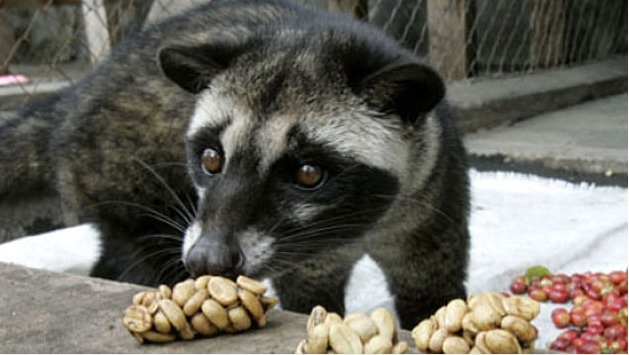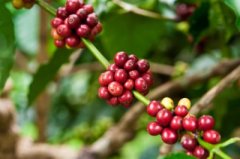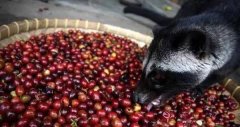How much is Kopi Luwak? the value of a cup of Kopi Luwak comes from the unique "planting" way.

For professional baristas, please follow the coffee workshop (Wechat official account cafe_style)
Kopi Luwak, which is ranked as the top 10 most expensive coffee in the world, is of course valuable. In addition to its taste, its uniqueness lies in its "planting" method. Kopi Luwak (Kopi Luwak) is produced in Indonesia, also known as "civet coffee". Indonesian civets (Luwak) have eaten coffee cherry berries, and coffee merchants take beans from their feces to make cat poop coffee beans with a unique taste.
Therefore, cat shit coffee is often labeled as a "wild source", but the Organization for the good treatment of Animals (PETA) has revealed that many civets are not "wild" but are confined to narrow, barren cages and forced to feed for a long time.
The number of wild civets is limited. In the past, merchants may pick up coffee beans excreted by wild civets from the forest, but with the increasing market demand, PETA found that some unjust businessmen even imprisoned civets for exorbitant profits.
In its article "HELP CIVETS SUFFERING FOR CRUEL COFFEE", PETA pointed out that investigators from its Asia division had visited coffee farms in Indonesia and the Philippines, two major civet coffee breeding places. They found that the vast majority of civets were "imprisoned" for at least three years, and some farm breeders even revealed:
There can be no wild civets.
However, civets with pointed mouths and dark gray fur are free by nature and like to play in the woods. If they are imprisoned in a cage, they will express their dissatisfaction on hunger strike. However, businessmen still force them to obey, and civets trapped in cages are often fed berries that are taller than them for a long time.
As can be seen from the footage taken by PETA, the civet paced back and forth, turned frantically, shook its head and gnawed at the cage and other nervous tension.
Reflect that they are in a state of continued madness and depression.
PETA also pointed out that civets are omnivorous animals that eat different ripe fruits. However, under forced feeding, they lose normal food and lose their feathers due to lack of nutrition and long-term pressure.
Overwork and the loss of feathers make them often weak to death.
Therefore, PETA urges the public not to misbelieve wild Kopi Luwak and to avoid buying and enjoying Kopi Luwak to help put an end to the inhumane treatment of civets.
Important Notice :
前街咖啡 FrontStreet Coffee has moved to new addredd:
FrontStreet Coffee Address: 315,Donghua East Road,GuangZhou
Tel:020 38364473
- Prev

How do you make Blue Mountain Coffee? One minute to teach you how to correctly distinguish authentic Jamaican Blue Mountain Coffee.
Professional baristas please follow the coffee workshop (Wechat official account cafe_style) Blue Mountain coffee beans, which are planted under the official law of Jamaica and the production process is under the strict supervision of the Jamaican Coffee Bureau. High-quality Blue Mountain coffee beans are famous for their balanced, mild taste, charming aroma and non-bitter taste. After decades of efforts, Lan
- Next

How much is the cat shit coffee powder in Kopi Luwak? how much is the gold variety in a jin of coffee?
The exchange of professional baristas please follow the coffee workshop (Wechat official account cafe_style). This is the mature coffee fruit eaten by the civet, which is discharged from the body through the digestive system, extracted and processed, due to the fermentation through the stomach, so the coffee produced has a different taste. At present, Kopi Luwak has become a hot item in the international market and a gold product in coffee.
Related
- Detailed explanation of Jadeite planting Land in Panamanian Jadeite Manor introduction to the grading system of Jadeite competitive bidding, Red bid, Green bid and Rose Summer
- Story of Coffee planting in Brenka region of Costa Rica Stonehenge Manor anaerobic heavy honey treatment of flavor mouth
- What's on the barrel of Blue Mountain Coffee beans?
- Can American coffee also pull flowers? How to use hot American style to pull out a good-looking pattern?
- Can you make a cold extract with coffee beans? What is the right proportion for cold-extracted coffee formula?
- Indonesian PWN Gold Mandrine Coffee Origin Features Flavor How to Chong? Mandolin coffee is American.
- A brief introduction to the flavor characteristics of Brazilian yellow bourbon coffee beans
- What is the effect of different water quality on the flavor of cold-extracted coffee? What kind of water is best for brewing coffee?
- Why do you think of Rose Summer whenever you mention Panamanian coffee?
- Introduction to the characteristics of authentic blue mountain coffee bean producing areas? What is the CIB Coffee Authority in Jamaica?

